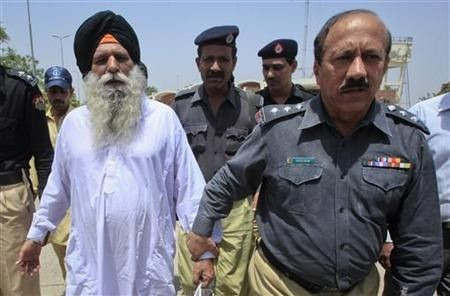Surjeet Singh?s Mysterious Release From Prison Raises Hopes For India-Pakistan Cooperation

Surjeet Singh returned to India after serving 31 years in a Pakistani prison for spying.
The 69-year-old Sikh was greeted by joyous friends and family upon crossing the border at Wagah, telling reporters that he wanted to pay his respects at the Sikh’s holy Golden Temple in Amritsar before departing for his native village in the Ferozpur district of Punjab.
Surjeet was originally arrested for spying on Pakistan in the early 1980s during the regime of Islamic hardliner General Zia al-Haq and was sentenced to life in prison. By 1985, that sentenced was upgraded to death. However, by the end of the decade, Pakistan’s President Ghulam Ishaq Khan commuted the death sentence back to life imprisonment.
After crossing into India on Thursday, Surjeet admitted to reporters that he was indeed guilty of spying on Pakistan.
“I was a RAW [Research and Analysis Wing] agent,” he told Indian media.
“No one bothered [looking] for me after I got arrested. Don't ask me too much... otherwise the BSF [Indian Border Security Force] will get annoyed.”
He also vowed never to return to Pakistan.
I was arrested earlier for spying charges. If I return again, the security agencies might suspect that I have come for spying again, he said.
However, it is unclear what exactly Surjeet was arrested for in the first place or how he came to be in Pakistan. He was apparently working as a low-level state employee at the time of his arrest. Other reports claim he is actually in his mid-70s and his real name is not Surjeet, but rather Makhan.
Also, Indian media reported that during his long confinement in Pakistani prisons, he had denied ever being a spy.
Surjeet also claimed he was treated well in prison.
Surjeet’s release from prison caused some confusion last week, when it was reported that another Indian prisoner in Pakistan with a similar name, Sarabjit Singh, was going to be freed from death row.
Surjeet told reporters in India that he is hopeful for Sarabjit’s early release, citing that he had met him on many occasions.
“I am sure now I will get Sarabjit Singh released from Pakistan jail, don’t know how I will do it but certainly I will meet the authorities concerned in India for Sarabjit Singh,” Surjeet said.
“He is not facing any problems there. He is fine. I used to see him on a weekly basis in the prison.”
Surjeet said the confusion arose from a spelling error.
“All this happened due to spelling mistakes as in Urdu language the spelling of Surjeet and Sarabjit are almost similar,” he claimed.
The Indian government welcomed the release of Surjeet Singh, but also called for the release of his compatriot Sarabjit, who has been locked up for more than two decades, following his conviction on charges he was involved in some bombings.
“I am happy that Surjeet Singh is being released and I hope that Pakistan will also seriously ponder and consider and release Sarabjit Singh also,” said India’s External Affairs Minister S. M. Krishna on Thursday.
Sarajbit’s sister is scheduled to meet with Krishan on Thursday.
Krishna also urged the government of Pakistan to release all other Indian prisoners languishing in Pakistani prisoners.
As India and Pakistan seek to thaw diplomatic relations that were severed by the Mumbai terrorist attacks in late 2008, both sides hope that more prisoners will be released from each nation.
Indeed, just a day prior to Surjeet’s release, Pakistan freed more than 300 Indian fishermen from a prison in Karachi as a goodwill gesture.
Many times authorities in India and Pakistan arrest each other’s nationals who happen to stray across the borders on charges of “spying.” It is unknown how many such prisoners are presently incarcerated.
Over the past two years, Pakistan has released at least two other Indians who had been incarcerated on charges of espionage – Gopal Das was released in April 2011 after serving 27 years in jail, while Kashmir Singh was freed in March 2008 after 25 years imprisonment.
Das was one of the longest-serving Indian inmates in Pakistani jails – his freedom came after Pakistan President Asif Ali Zardari intervened in his case.
(However, both Das and Singh claimed the Indian government did little to secure their releases, something Surjeet Singh also alluded to)
Indian legal experts think both countries are to blame for the long prison terms of alleged “spies.”
Speaking on the Surjeet Singh case, Retired Justice RS Sodhi of the Delhi High Court told the Jagran Post newspaper: “Justice delayed is justice denied. The political system of both countries has to be blamed for Surjeet’s long trauma. The irony is that he is finally released from jail for the offense he had committed 30 years ago. Strange! What kind of system we have where a man has to languish in a jail for continuously 30 years.”
Another retired Indian judge, Justice VN Khare of the Supreme Court, said people like Surjeet are victims of both nations’ paranoia.
“Thirty years is a long period and precious time for each and every individual,” he said. “Forget about Surjeet. Think from the angle of humanity and being sensible. His life has almost, you can say, been spent in jail. What a pity it is? Releasing a man from jail at this age means that both the countries need to seriously introspect into such kind of sensitive issues.”
© Copyright IBTimes 2024. All rights reserved.




















